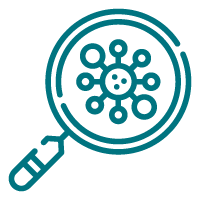POST COVID TREATMENT OPTIONS
Long-COVID or Post-COVID Conditions
According to the Department of Health and Human Services (HHS) in collaboration with CDC and other partners “Long COVID is broadly defined as signs, symptoms, and conditions that continue or develop after initial COVID-19 or SARS-CoV-2 infection. The signs, symptoms, and conditions are present four weeks or more after the initial phase of infection; may be multisystemic; and may present with a relapsing– remitting pattern and progression or worsening over time, with the possibility of severe and life-threatening events even months or years after infection. Long COVID is not one condition. It represents many potentially overlapping entities, likely with different biological causes and different sets of risk factors and outcomes.”
Long COVID is commonly referred to by several designations, including Post-COVID Conditions, long-haul COVID, post-acute COVID-19, long-term effects of COVID, and chronic COVID. The term post-acute sequelae of SARS CoV-2 infection (PASC) is also used to refer to a subset of Long COVID.
What we know about long COVID
Long COVID is a varied series of new, recurring, or continuing health problems that people experience after being infected with the virus that causes COVID-19. Most people with COVID-19 recover within days to a couple of weeks after infection; however, 4 weeks after infection is when Long COVID can be recognized. Everyone who was infected with COVID-19 can experience Long COVID.
Currently, there is not a test that determines your symptoms are due to COVID-19. To confirm a Long COVID diagnosis, a medical professional might conduct a health examination. This would include a thorough assessment of your medical history, including if you had a diagnosis of COVID-19 with a confirmed positive test, symptoms, or exposure.
Who can get long COVID?
Researchers are hard at work in examining which people or groups of people are more likely to have Long COVID. Studies collaborate certain groups of people are affected more than others by Long COVID. Certain groups are at higher risk of getting sick from COVID-19 based on where they live or work, or because they can’t get adequate medical care. Health inequities puts racial or ethnic minority groups and people with disabilities at higher risk for developing Long COVID. Scientists are researching some factors that may put these communities at greater risk of getting infected or developing Long COVID.
The greatest means of prevention is to protect yourself and others from infection. When eligible, CDC recommends staying up to date on COVID-19 vaccination, improving ventilation, getting tested, and if eligible seek treatment. Some additional preventative measures include social distance and avoid close contact with suspected or confirmed COVID-19 cases. Thoroughly Washing hands and/or using alcohol-based hand sanitizer when available.
What is the cause of long COVID?
While the exact cause is currently under investigation, evidence has suggested that symptoms and conditions could be related to one or more of the following:
- Chronic inflammation
- Small blood clots
- Dysregulation of the immune system
- Generation of auto-antibodies
- Organ damage
- Viral persistence
- Reactivation of other viruses (e.g., Epstein-Barr virus)
- Sequelae of critical illness
- Exacerbations of underlying health conditions
A few additional examples of people or groups who might be at greater risk than other groups for developing Long COVID might include:
- People who have experienced severe COVID-19 illness, especially those who were hospitalized or required intensive care
- People who have underlying health conditions prior to COVID-19
- People who have been vaccinated against COVID-19
- People who experience multisystem inflammatory syndrome (MIS) during or after COVID-19 illness
What are the symptoms of long COVID?
Long COVID does not affect everyone the same way. People with Long COVID may experience health problems with a wide range of symptoms lasting weeks, months, or even years after infection. Often the symptoms can resolve and return later. Though most patients’ symptoms slowly improve over time, speaking with your healthcare provider about the symptoms you are experiencing after having COVID-19 could help determine if you might have Long COVID.
Research studies are still currently under investigation, but people who experience Long COVID most commonly report:
General symptoms (Not a Comprehensive List)
- Tiredness or fatigue that interferes with activities of daily living
- Symptoms that get worse after physical or mental effort (also known as “post-exertional malaise”)
- Fever
Respiratory and heart symptoms
- Difficulty breathing and/or shortness of breath
- Cough
- Chest pain
- Fast-beating or pounding heart (also known as heart palpitations)
Neurological symptoms
- Difficulty thinking or concentrating (sometimes referred to as “brain fog”)
- Headache
- Sleep problems
- Dizziness when you stand up (lightheadedness)
- Pins-and-needles feelings
- Change in smell or taste.
- Depression or anxiety
Digestive symptoms
- Diarrhea
- Stomach pain
Other symptoms
- Joint or muscle pain
- Rash
- Changes in menstrual cycles
Treatment for Long COVID?
There is currently not an approved medication for Long COVID, but health care providers can provide care to reduce symptoms of Long COVID. For most people with long COVID, the goal of medical management is to optimize function and quality of life.
Diaries and calendars might be useful to document changes in symptoms, especially in relation to potential triggers such as exertion (physical and cognitive), foods, menstruation, and treatments or medications. Such diaries and calendars can provide greater insight into symptoms and lived experience.
There are reports that vaccination may improve symptoms of long COVID for some patients. More research will help to better understand these reports.
Available resources and support:
For Patients:
- Caring for People with Post-COVID Conditions
- Preparing for Appointments for Post-COVID Conditions
- Researching COVID to Enhance Recovery
- Guidance on “Long COVID” as a Disability Under the ADA
- Coronavirus Resources | U.S. Department of Labor
Advocacy and Support Groups:
For Healthcare Providers:
CDC:Center for Disease Control and Prevention:
- Post-COVID Conditions: Healthcare Providers
- Evaluating and Supporting Patients with Long COVID in Returning to Work (cdc.gov)
Tools and Resources:
- COVID.gov
- Medical Professional Organization Expert Opinion and Consensus Statements
- Support Groups
- Symptom and Condition Assessments
- Long COVID, Other Fatiguing Illnesses, and Disability
- Educational Programs for Healthcare Providers
- Other Tools and Resources
National Institutes of Health (NIH):
- About the Initiative | RECOVER COVID Initiative
- Long COVID | NIH COVID-19 Research
- NIH launches long COVID clinical trials through RECOVER Initiative, opening enrollment | National Institutes of Health (NIH)
World Health Organization (WHO):
Infectious Diseases Society of America (IDSA):
- Long COVID: From Mechanism to Treatment (idsociety.org)
- COVID-19 Real-Time Learning Network (idsociety.org)
American Academy of Physical Medicine and Rehabilitation (AAPM&R)

